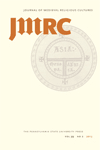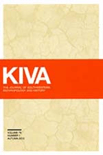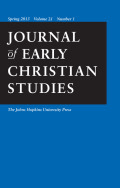
Deltion of the Christian Archaeological Society
Scope & Guideline
Championing Research that Connects the Dots of History and Belief
Introduction
Aims and Scopes
- Byzantine Archaeology:
The journal extensively covers archaeological findings from the Byzantine period, including artifacts, structures, and sites, highlighting their historical significance. - Architecture and Art History:
A key focus is on the analysis of Byzantine architecture and art, exploring stylistic developments, construction techniques, and iconography. - Epigraphy and Palaeography:
The journal includes studies on inscriptions and manuscripts, offering insights into the socio-political and cultural contexts of Byzantine society. - Cultural Interactions and Influences:
Research on the interactions between Byzantine culture and neighboring civilizations, including the Ottoman Empire and Western Europe, is a consistent theme. - Christian Practices and Iconography:
The exploration of religious practices, iconography, and the evolution of saints' cults within the Byzantine context is a significant area of inquiry.
Trending and Emerging
- Interdisciplinary Approaches:
There is a growing trend towards interdisciplinary research, combining archaeology, art history, and epigraphy to provide holistic insights into Byzantine culture. - Focus on Material Culture:
Recent publications increasingly emphasize the importance of material culture, including artifacts and architecture, as critical to understanding the social and religious practices of the Byzantine era. - Iconographic Studies:
There is a notable increase in studies examining iconography, particularly in relation to specific saints and religious themes, reflecting a renewed interest in visual culture. - Cultural Heritage and Preservation:
Emerging themes include discussions on the preservation of Byzantine sites and artifacts, highlighting the importance of cultural heritage in contemporary scholarship. - Military Architecture and Defense Systems:
Research on Byzantine fortifications and military architecture has gained momentum, exploring how these structures reflect historical contexts and societal needs.
Declining or Waning
- Late Byzantine Political History:
Research on the political history of the late Byzantine period, including governance and military strategies, has become less frequent, possibly overshadowed by more prominent archaeological and artistic studies. - General Byzantine Literature:
The exploration of Byzantine literature as a standalone topic has waned, with fewer papers dedicated specifically to literary analysis in comparison to archaeological and artistic studies. - Regional Studies Outside Major Centers:
There seems to be a decline in studies focused on less prominent Byzantine regions, with a shift towards more significant sites and cities such as Constantinople and Thessaloniki.
Similar Journals

Codex Aquilarensis
Exploring the Intersection of History and Visual ArtsCodex Aquilarensis is a distinguished academic journal published by FUNDACION SANTA MARIA REAL, CENTRO ESTUDIOS ROMANICO, specializing in History and Visual Arts and Performing Arts. With an ISSN of 0214-896X and an E-ISSN of 2386-6454, this journal has carved its niche within the scholarly community in Spain, encompassing a range of topics pertinent to its fields of study. Although it currently holds a Q4 category in both History and Visual Arts and Performing Arts as of 2023, it plays a critical role in disseminating important research and insights from 2015 to 2022, contributing to the academic dialogue around these disciplines. While access options are limited, the journal's commitment to enhancing understanding in the arts and humanities makes it a valuable resource for researchers, professionals, and students alike. Its ranking within Scopus further underscores its relevance, positioning it within the competitive landscape of arts and humanities research. Scholars and practitioners interested in historical and artistic studies are encouraged to engage with the content presented by Codex Aquilarensis as it continues to evolve and contribute to the intellectual heritage of the region.

Journal of Medieval Religious Cultures
Exploring the Divine: Unraveling Medieval Beliefs and CulturesJournal of Medieval Religious Cultures, published by Penn State University Press, stands as a vital resource for scholars in the fields of History and Religious Studies. With its ISSN 1947-6566 and E-ISSN 2153-9650, this journal provides a platform for high-quality research focused on the intersections of religion, culture, and society during the medieval period. Its current impact factor underscores its relevance and citation frequency in academic circles, solidifying its position in the Q3 quartile for both categories as of 2023. The journal's commitment to fostering scholarly dialogue makes it an essential read for researchers, professionals, and students alike, exploring topics that shape our understanding of medieval religious practices and beliefs. Although it does not offer open access, the journal ensures that its contributions are accessible through various academic libraries, facilitating valuable insights into a pivotal era of history. Explore the latest findings and engage with leading scholarship published from 2014 to 2024 at Penn State University Press.

Journal for the Study of Christian Culture
Advancing Understanding of Faith's Cultural ImpactJournal for the Study of Christian Culture, published by the Institute for the Study of Christian Culture at Renmin University of China, serves as a critical platform for academic discourse in the interdisciplinary field of Christian studies. With an ISSN of 2071-9957, this journal aims to illuminate the dynamic interplay between Christian thought and cultural contexts, fostering a deeper understanding of how faith influences and is influenced by society. Although currently not Open Access, the journal attracts a diverse readership, including researchers, students, and professionals devoted to exploring theological, historical, and sociocultural dimensions of Christianity. The journal encourages submissions that contribute original research and significant insights, securing its position as an essential resource for those engaged in the study of Christian culture globally. The journal's commitment to excellence and scholarly rigor positions it as a key player in advancing knowledge in this vital field.

Azania-Archaeological Research in Africa
Unearthing Africa's Rich Heritage.Azania-Archaeological Research in Africa, published by Routledge Journals, Taylor & Francis Ltd, stands as a premier academic resource in the field of archaeology, specifically focusing on African archaeological research. With a remarkable tradition dating back to 1966, the journal spans over half a century of rigorous scholarship, aiming to enrich our understanding of Africa's diverse cultural and historical narratives. Currently indexed in the prestigious Q1 category for both Archaeology and Arts and Humanities, it ranks impressively in the Scopus database, placing within the top 12% of journals in its field. This commitment to excellence facilitates the dissemination of innovative and insightful research, catering to a broad audience of researchers, professionals, and students alike. While the journal is not open access, its impactful contributions continue to shape contemporary archaeological discourse, making it an essential resource for anyone passionate about the study of Africa's archaeological heritage.

OLBA
Reviving Interest in Archaeological NarrativesOLBA is a distinguished journal in the field of archaeology, published by Mersin University Publications Research Center Cilician Archaeology in Turkey. With an ISSN of 1301-7667, this academic journal has been a platform for scholarly discourse from 2009 to 2014 and again from 2016 to 2019, with a recent volume published in 2022. Although it is currently categorized in the fourth quartile (Q4) for both Arts and Humanities and Social Sciences within archaeology, OLBA continues to contribute significantly to the global archaeology community. It serves as an essential resource for researchers, professionals, and students interested in the diverse aspects of archaeological studies and cultural heritage. Despite not being an open-access journal, OLBA strives to disseminate knowledge effectively, aiding in the exploration of ancient civilizations and the rich tapestry of human history. Its Scopus rankings, placing it in the bottom percentiles, demonstrate the ongoing need for the community to support and engage with the journal to enhance its visibility and impact in the archaeological domain.

Vestnik Drevnei Istorii-Journal of Ancient History
Illuminating the Past for a Brighter FutureVestnik Drevnei Istorii - Journal of Ancient History, published by the esteemed Russian Academy of Sciences and the State Academy of Humanities (GAUGN), plays a pivotal role in the interdisciplinary field of ancient studies. Fostering scholarly discourse since 2016, this journal is positioned at the crossroads of archaeology, classics, history, and linguistics, as evidenced by its impressive 2023 ranking in multiple categories, including Q1 in Classics and Q2 in History. Although not open access, it serves as a critical resource for researchers, professionals, and students interested in deepening their understanding of ancient societies and cultures. With a reputation for rigor and a commitment to advancing knowledge, the journal aims to disseminate innovative research that sheds light on the complexities of ancient civilizations and their contributions to contemporary society. Current issues and a wealth of archived articles are available for exploration, fostering a rich environment for scholarly engagement.

Kiva-Journal of Southwestern Anthropology and History
Charting New Territories in Archaeological ResearchKiva - Journal of Southwestern Anthropology and History is a distinguished academic journal published by Routledge Journals, Taylor & Francis Ltd, that serves as a vital resource for scholars in the fields of anthropology, archaeology, and history. With an ISSN of 0023-1940 and an E-ISSN of 2051-6177, this journal has established itself as a significant avenue for scholarly communication since its inception in 1964. It consistently ranks in the top quartiles, including Q1 in Archaeology and Q2 in Anthropology, reflecting its high impact and rigorous peer-review process. Covering a wide array of topics pertinent to the Southwestern United States, Kiva invites original research articles, reviews, and methodological papers that advance understanding of the region's rich cultural heritage and historical narratives. While currently not open access, its commitment to disseminating quality research makes it an essential reading for researchers, professionals, and students aiming to explore the multifaceted dimensions of southwestern studies.

Lucentum
Fostering Knowledge Across DisciplinesLucentum is a distinguished open-access journal published by Universidad de Alicante, focusing on the interdisciplinary fields of Archeology, History, and Paleontology. Since its inception in 1982, it has established itself as a vital platform for scholars and researchers to disseminate their findings, contributing significantly to the academic landscape in Spain and beyond. The journal's notable rankings, including Q1 status in History and Q2 in Archeology, reflect its commitment to high-quality scholarship and rigorous peer review. With an impressive impact factor and recognition in Scopus, Lucentum serves as an essential resource for professionals, students, and historians, fostering a deeper understanding of cultural and historical contexts through a wealth of interdisciplinary research. The journal continues to embrace open access, ensuring that critical knowledge is freely available to the global research community.

Romische Quartalschrift fur Christliche Altertumskunde und Kirchengeschichte
Connecting Past and Present in Church Studies.Romische Quartalschrift fur Christliche Altertumskunde und Kirchengeschichte is a prestigious academic journal published by VERLAG HERDER GMBH that focuses on the intricate fields of Christian antiquity and church history. With its origins steeped in rigorous scholarly tradition, this journal provides a critical platform for researchers, professionals, and students to share their findings and insights, fostering a deeper understanding of the historical and cultural contexts of Christianity. Despite its discontinuation in Scopus from 2002 to 2014, it continues to be a vital resource for those engaged in religious studies, history, and archaeology, as evidenced by its rankings in the relevant categories. Although it does not offer Open Access options, the journal's contributions to the academic community remain significant and informative, encouraging rich dialogue and exploration among scholars in these disciplines. Located at Hermann-Herder-Str 4, Freiburg im Breisgau 79104, Germany, the journal invites submissions that ensure a continuous discourse on the impacts of Christian heritage and its intersections with various domains of historical inquiry.

JOURNAL OF EARLY CHRISTIAN STUDIES
Exploring the Foundations of Faith and HistoryJournal of Early Christian Studies, published by Johns Hopkins University Press, is a prestigious academic journal that delves into the rich history and development of early Christianity. With an ISSN of 1067-6341 and an E-ISSN of 1086-3184, this journal has established itself as an essential platform for scholars and researchers interested in the intersections of religion, history, and culture from antiquity to the early medieval period. Ranked in the Q2 category in both History and Religious Studies as of 2023, it holds a commendable status within the academic community, reflected in its Scopus ranks. Though it does not offer open access, readers can expect rigorous peer-reviewed articles that contribute to ongoing dialogues in the field and leverage interdisciplinary approaches to the study of early Christian texts and practices. With a commitment to advancing knowledge from 2002 through 2024, the journal provides vital insights that appeal to researchers, professionals, and students alike, fostering a deeper understanding of early Christian narratives and their impact on contemporary thought.